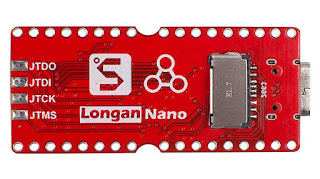Longan Nano : Making a simple signal generator

The Goal here is to make a simple signal generator with the longan nano. We'll just add a rotary encoder and that's it. It must be able to output sine, square and triangle sine up to ~ 100 kHz. So first thing first : How ? Using the internal DAC(s) to generate the signal. Let's have a look at it. DAC The dual DAC is a 8Bits/12 bits digital to analog converter connected to PA4/PA5. It seems the pins used are hardwired and cannot be changed. That could be a problem as they are shared with 2 SPI0 signals, connected to the screen. The DAC will do a conversion each time a trigger event happens. That event can either be software (i.e. you write a register) or a timer. A DMA can be scheduled using said timer too. What does it mean for us ? It means we prepare the data to send, a sine wave for example in a buffer, setup a DMA transfer and program the timer so that a new sample is sent to the DAC at the proper time. Each time the timer rolls over, the DMA will send the next samp